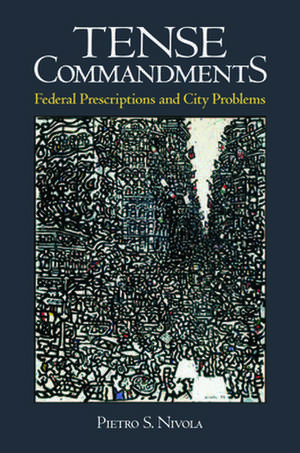Tense Commandments: Federal Prescriptions and City Problems
Autor Pietro S. Nivolaen Limba Engleză Paperback – 21 aug 2002
During the past decade, dozens of large cities lost population as jobs and people kept moving to the suburbs. Despite widespread urban revitalization and renewal, one fact remains unmistakable: when choosing where to live and work, Americans prefer the suburbs to the cities. Many underlying causes of the urban predicament are familiar: disproportionate poverty, stiff city tax rates, and certain unsatisfactory municipal services (most notably, public schools). Less recognized is the distinct possibility that sometimes the regulatory policies of the federal government—the rules and rulings imposed by its judges, bureaucrats, and lawmakers—further disadvantage the cities, ultimately burdening their ability to attract residents and businesses. In Tense Commandments, Pietro S. Nivola encourages renewed reflection on the suitable balance between national and local domains. He examines an array of directive or supervisory methods by which federal policymakers narrow local autonomy and complicate the work urban governments are supposed to do. Urban taxpayers finance many costly projects that are prescribed by federal law. A handful of national rules bore down on local governments before 1965. Today these governments labor under hundreds of so-called unfunded mandates. Federal aid to large cities has lagged behind a profusion of mandated expenditures, at times straining municipal budgets. Apart from their fiscal impacts, Nivola argues, various federal prescriptions impinge on local administration of routine services, tying the hands of managers and complicating city improvements. Nivola includes case studies of six cities: Baltimore, Philadelphia, New York, Chicago, San Francisco, and Los Angeles. He describes the "politics of paternalism," the political pressures that federal regulations place on governance. Then he offers comparisons with various political systems abroad, including Germany, the U.K., France, and Italy. As the nation and its cities brace for a long and arduous effort to combat terrorism, Nivola recommends that federal mandates be evaluated with a standard question: are they socially beneficial, or do they deprive localities of discretion, distort legitimate local priorities, and perhaps misallocate resources? In today's intricate federal system, the unencumbered capacity of governments at all levels to define their roles and concentrate on their core functions and responsibilities seems urgent.
Preț: 198.35 lei
Nou
Puncte Express: 298
Preț estimativ în valută:
37.96€ • 41.22$ • 31.89£
37.96€ • 41.22$ • 31.89£
Carte tipărită la comandă
Livrare economică 22 aprilie-06 mai
Preluare comenzi: 021 569.72.76
Specificații
ISBN-13: 9780815760948
ISBN-10: 0815760949
Pagini: 184
Dimensiuni: 152 x 229 x 17 mm
Greutate: 0.33 kg
Ediția:New.
Editura: Brookings Institution Press
Colecția Brookings Institution Press
Locul publicării:United States
ISBN-10: 0815760949
Pagini: 184
Dimensiuni: 152 x 229 x 17 mm
Greutate: 0.33 kg
Ediția:New.
Editura: Brookings Institution Press
Colecția Brookings Institution Press
Locul publicării:United States
Notă biografică
By Pietro S. Nivola
Descriere
During the past decade, dozens of large cities lost population as jobs and people kept moving to the suburbs. Despite widespread urban revitalization and renewal, one fact remains unmistakable: when choosing where to live and work, Americans prefer the suburbs to the cities. Many underlying causes of the urban predicament are familiar: disproportionate poverty, stiff city tax rates, and certain unsatisfactory municipal services (most notably, public schools). Less recognized is the distinct possibility that sometimes the regulatory policies of the federal government—the rules and rulings imposed by its judges, bureaucrats, and lawmakers—further disadvantage the cities, ultimately burdening their ability to attract residents and businesses. In Tense Commandments, Pietro S. Nivola encourages renewed reflection on the suitable balance between national and local domains. He examines an array of directive or supervisory methods by which federal policymakers narrow local autonomy and complicate the work urban governments are supposed to do. Urban taxpayers finance many costly projects that are prescribed by federal law. A handful of national rules bore down on local governments before 1965. Today these governments labor under hundreds of so-called unfunded mandates. Federal aid to large cities has lagged behind a profusion of mandated expenditures, at times straining municipal budgets. Apart from their fiscal impacts, Nivola argues, various federal prescriptions impinge on local administration of routine services, tying the hands of managers and complicating city improvements. Nivola includes case studies of six cities: Baltimore, Philadelphia, New York, Chicago, San Francisco, and Los Angeles. He describes the "politics of paternalism," the political pressures that federal regulations place on governance. Then he offers comparisons with various political systems abroad, including Germany, the U.K., France, and Italy. As the nation and its cities brace f
















